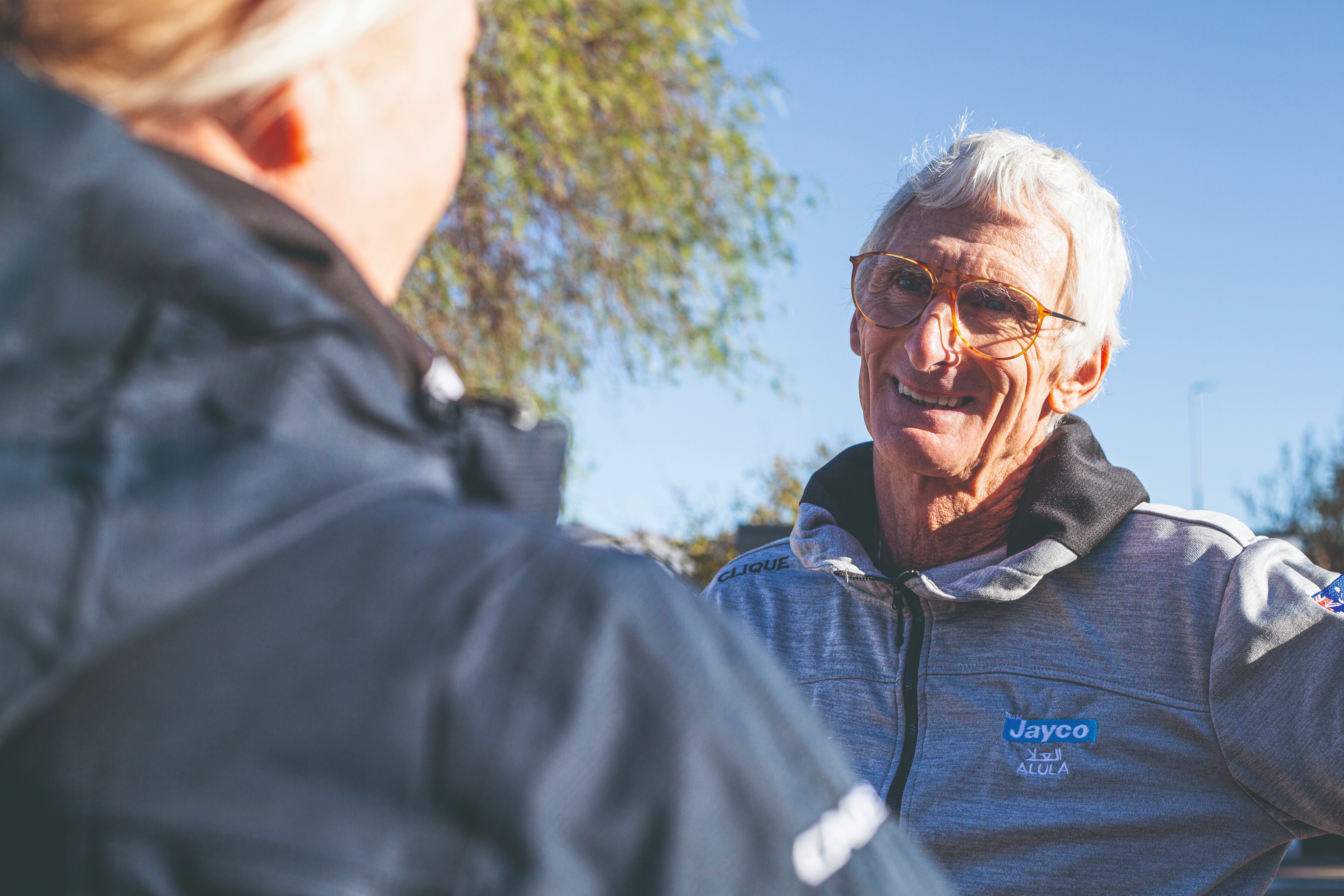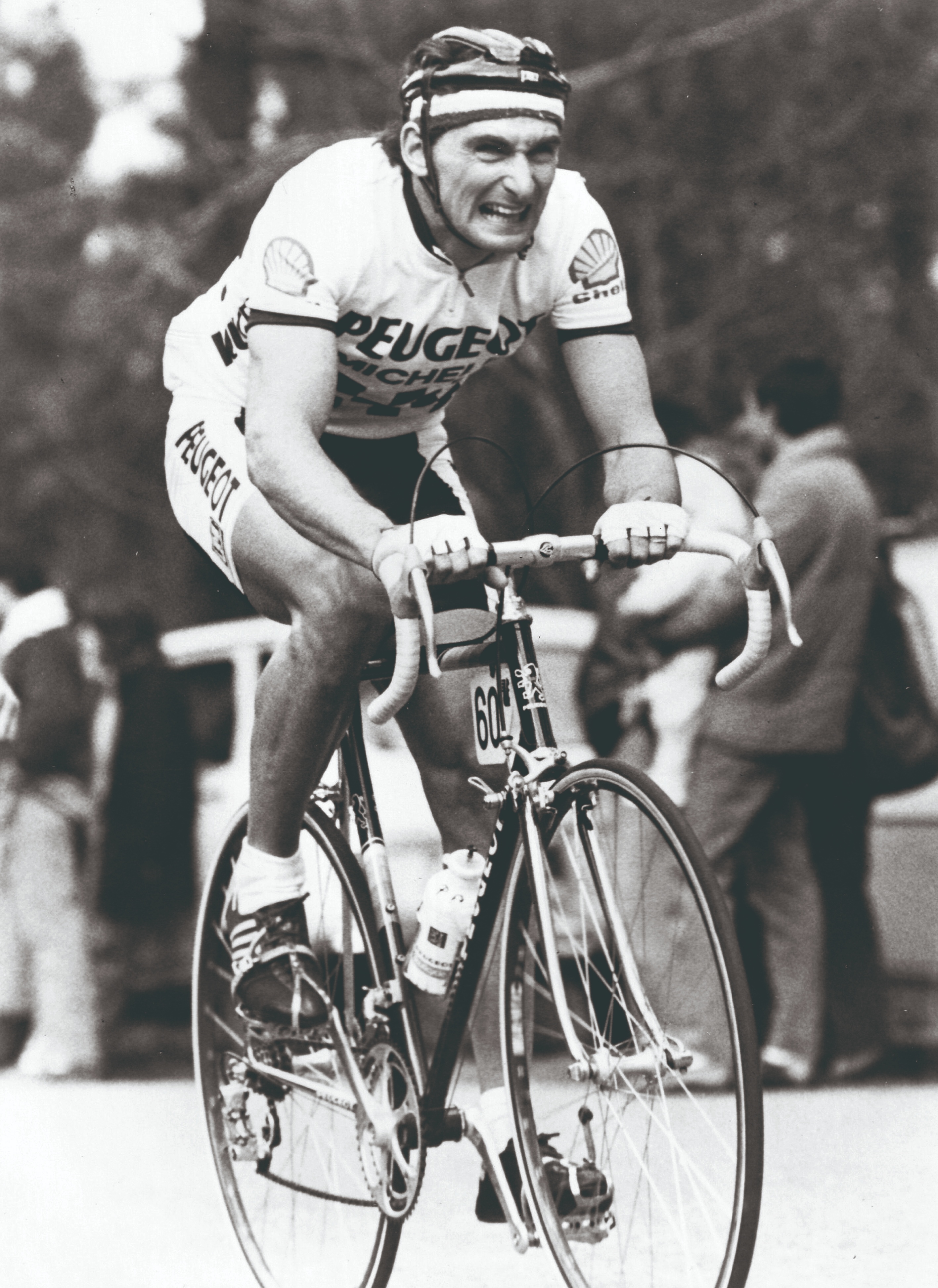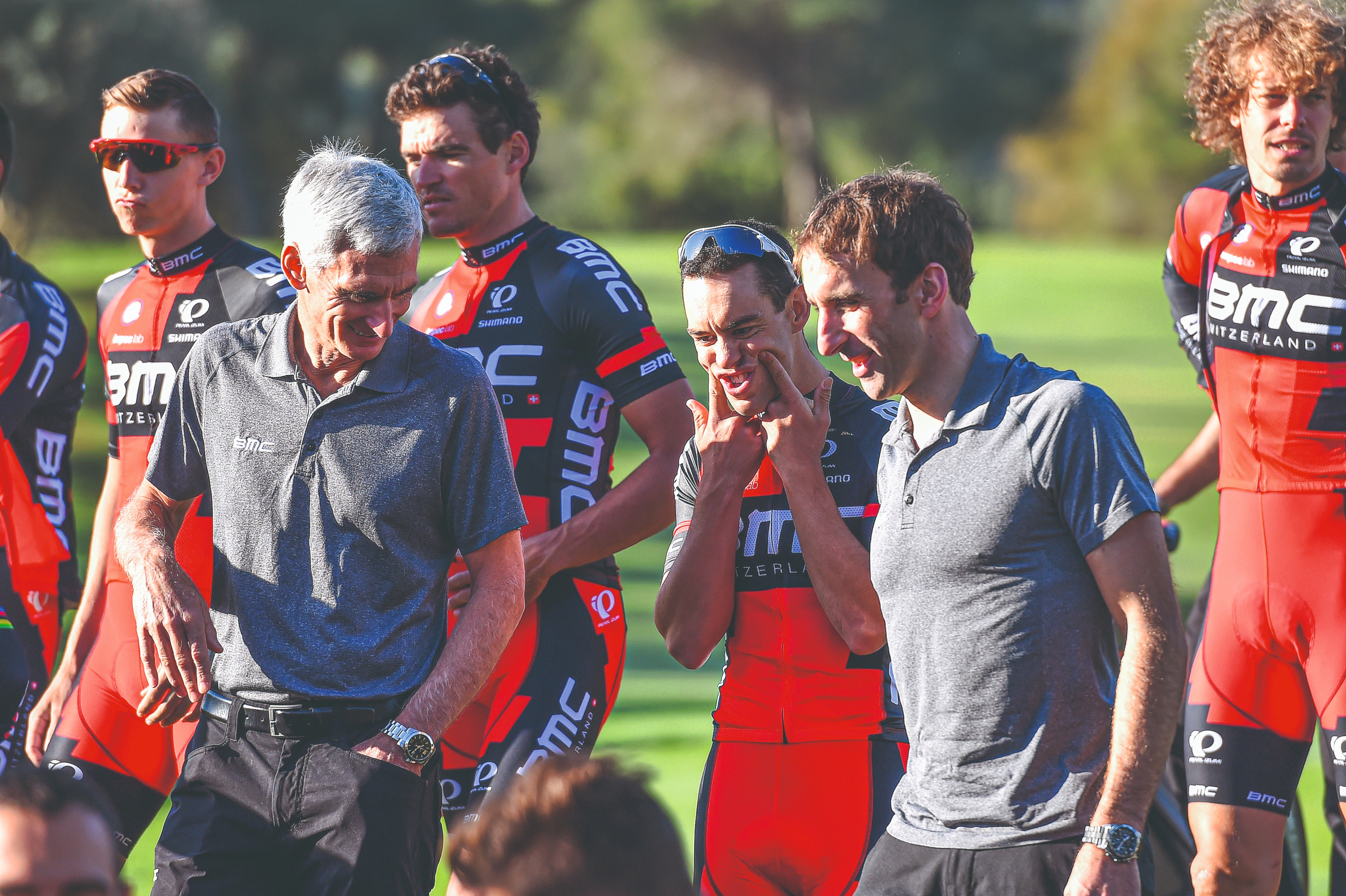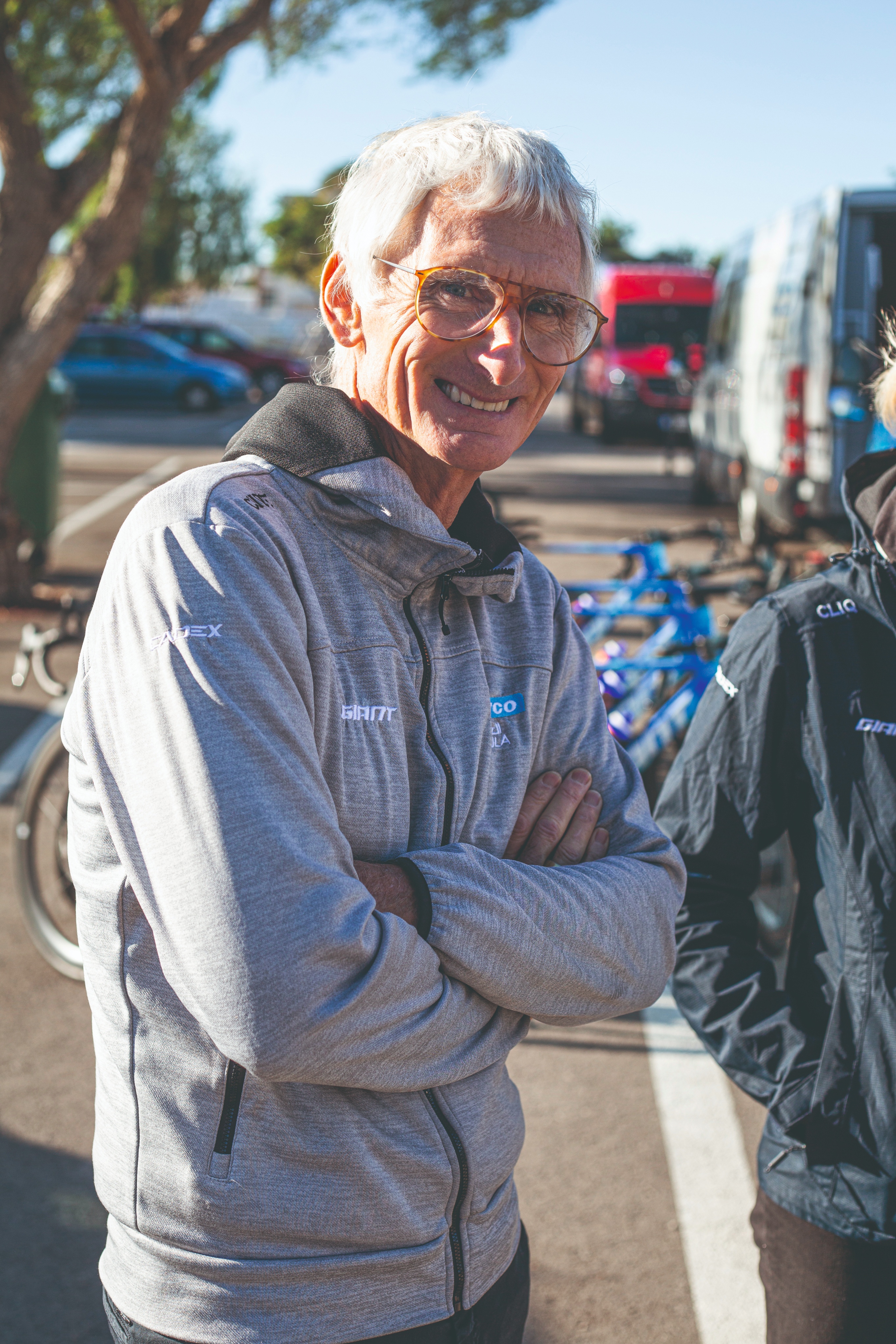
“In the last couple of years, the hormone treatment has really tested me,” Allan Peiper says. Prostate cancer’s grip – sometimes loose, other times firm – on him is approaching its decade anniversary. “The radiotherapy has been really hard; chemotherapy has been an absolute nightmare. It has a big effect on your mental and emotional state.” The daily cycle has often gone something like this: “In tears all of the time, not wanting to get out of bed, not enjoying life, struggling with everything because your system is totally shut down. You’re a mess as a human being. No one wants to live like that.”
The Australian, a constant figure in the upper echelons of cycling since the 1980s, has on occasion questioned whether he wanted to live at all, he says: “There have been moments in the middle of treatment where my body has been falling apart and I’ve thought, ‘you know what, I’m just up the hill from the railway tracks. If I just went there…’” The 63-year-old pauses. “It’s not like I was ever going to do that, but it’s the sort of thing you think about because your mind gets so clouded.”
It was November 2014 that Peiper – a winner of 20 professional races during his career – was first diagnosed with prostate cancer, the most frequent type of cancer in men (see 'risks and diagnosis', below). “It was earth-shattering. It was disbelief, apathy. Then grief. I felt like the rug had been pulled from under me. How long would I have left? So many questions and I didn’t understand anything. It was very scary.”
Peiper had his prostate removed and recovered, but he began a journey of regular check-ups to monitor the score of his PSA levels (prostate-specific antigen – a potential cancer risk marker). “It’s not like I’ve had cancer and it’s come back – it was never gone. The prostate had broken, the cells had spread through my body. It was like spreading a handful of grass seeds and hoping they didn’t grow.”
Twice, his PSA was so high that he had to restart heavy treatment, face up again to the prospect of a life cut shorter than expected. “People say they’re not scared of dying, and I said the same thing. Then it confronts you and you s**t yourself.”
Pro cycling stalwart

To many readers, Peiper will be a familiar figure. He’s woven deeply into fabric of cycling over the past half-a-century, and that’s just the way a boy from the state of Victoria always wanted it: “When we started discussing the possibility of an interview, I realised how important bikes have been for me.
“When I was aged 10, I didn’t want anything except a bike. It was my gateway to freedom, to go out adventuring, to jump out of the window in the morning and to head into the field. I then started racing, travelling the world, became a pro.”
He was successful: a time triallist and Classics-like rider, he won stages at the Giro d’Italia, Paris-Nice, Critérium du Dauphiné, and took GC victories at the Tours of Sweden and Picardie.
“Then I became a DS, rubbing shoulders with the best in the world.” Also a massive success: he was part of the HTC-Highroad sports directors’ team, managing Mark Cavendish in his pomp, then at BMC Racing for six years, before latterly being UAE-Team Emirates’ lead DS.
“I’ve never described myself as a fan of cycling. I like watching bike racing, but it’s the contact with the riders, staff, teams that motivates me, that buzz. Sharing space with young, motivated, talented people is exhilarating.”
In 2020, six years after his initial diagnosis for prostate cancer, Peiper directed Tadej Pogačar to his maiden Tour de France win. “I didn’t even think I’d ever be a directeur sportif anymore and then I won the Tour with Tadej.” He smiles. “There are positives to take out of everything.” The young Slovenian had a special bond with Peiper. “Allan was probably the best DS I ever had,” he said last year. “I really miss him. In 2020 he was so good with the tactical plans, everything he said in the bus, with the programme, it was just perfect.”
Peiper stopped working as a DS at the end of 2021, and in 2022, with cancer taking a stranglehold on him for the third time, he underwent six intense months of treatment that left him physically and mentally exhausted. “My specialists wanted me to continue with treatment as it had worked so well, but I said no because I wanted to focus on quality of life instead of longevity.”
He rejoined UAE Team Emirates between December and February as a consultant, but since April has been working in a similar role for Jayco-AlUla. “The job is looking at their performance team, peeling back the layers, examining all levels, and giving my advice and opinion on how things can improve. There are a lot of good things in place. Being involved gives me something to focus on that I know about.”
Giving back

Rider: 20 professional wins, Giro d’Italia stage 14, 1990 Paris-Nice prologue, 1985 Critérium du Dauphiné prologue, 1984 Tour of Sweden, 1984 Tour of Picardie, 1984
DS: Tour de France 2020 with Tadej Pogačar Giro d’Italia 2012 with Ryder Hesjedal Tour de Suisse 2018 with Richie Porte World Championship time trial 2018 with Rohan Dennis 2x World Championship team time trial with BMC Racing
From his home in Rozebeke, Belgium, Peiper and I first speak on the eve of the 2023 Giro d’Italia. Life in recent months has been good, but he’s had to pass many dark days to get to this point. “There are moments when I’m really down, don’t want to connect with people, really at rock bottom. But I’ve never felt that I am a victim in all of this. I’ve never said, ‘why me?’ Whatever you want to call it, for me there is a higher force, a reason for all of this. I can’t work it out, but it is what it is.”
Five months after our initial interview, we speak again. “I’m feeling really good,” he beams. “I’ve gone a year without treatment. In June my cancer markers had gone up quite a bit, but the scan I did looked pretty stable and my specialist said that everything was good. He said if I had no symptoms when I did a blood test in September he would see me in December.
“It was like I had won the national lottery. My wife and I cried four times before we reached the hospital’s reception, four times before we got to the centre of town, and then cried again over coffee. It was a pretty amazing time because I was 99% sure I was about to go back down a deep, ugly tunnel, but then I got a reprieve.”
More than 80% of men will survive prostate cancer for 10 or more years. “We’ve more or less used up all of the arsenals they’ve got from the operations to chemo to radiotherapy to hormone treatment. It’s been an intensive nine years. It’s hard to bounce back; every time it takes months, but at the same time I feel very lucky and blessed that I’ve had nine years, been able to work most of that time, and still keep the quality of my life relatively high.”
This year has seen Peiper focus his energies on his consultancy work with Jayco-AlUla, and also his family life. With Katrien, his wife of three years, this summer the couple became foster parents to two young girls; Peiper has a 25-year-old son from a previous marriage, and Katrien also has two adopted boys living with them.
“When I left home at 16, I had a lot of help, living with loads of families in Australia and Belgium. I realised how many people helped me, did things for me, and the big effect that had on my life. I had this vision in my mind of walking down a street holding hands with a little child, looking at myself from the back. I wanted to give something back. The two foster girls come every second weekend and for the holidays. We are their safety net.”
Back on the bike

As a high-profile name within cycling, Peiper’s health problems are well-known.
“The cycling world is always asking how I am doing. I’m not looking for attention, but I don’t see the need for secrecy. You don’t have to give out all of the details all of the time, but cancer is part of society. I don’t think there’s anybody who’s not been touched by cancer.”
His biggest aid in his near-decade long battle has been his bike. Indeed, he has just returned from a three-hour ride on his e-bike before we last speak. “Putting my leg over the bike is the crux of my life. Last summer there were moments when I had given up ever riding my bike again. I didn’t have the energy.
“But then I did a test ride of an e-bike for 10km and it opened up a whole new world for me. Going out for over an hour, in shorts, oil on my legs, stopping for a coffee, being able to grasp what is me, that inner bike rider, it’s motivating. I come back with a buzz, I’ve been in the zone of riding my bike, I’ve thought clearly. “There have been times I’ve stopped and cried for 10 minutes at the side of the road – the bike’s been the biggest therapeutic element for me. When you can source an endorphin buzz, an inner balance, every time you do something, that’s pretty amazing. Cycling is my life. I love this sport.”
Prostate Cancer: risks and diagnosis
Prostate cancer is the most common cancer among males, with one in eight men diagnosed with the disease in their lifetime, rising to one in four for black men.
In the UK, more than 12,000 men die from prostate cancer every year, while half-a-million are living with and after treatment. It mostly affects men over 50, and the risk increases as one gets older. A person is two-and-a-half times more likely to get prostate cancer if their father or brother has had it.
Symptoms to watch out for include difficulty in starting to urinate; frequent urination, especially at night; pain or a burning sensation during urination; blood in the urine or semen; regular pain in the back, hips or pelvis.
Despite conflicting news reports over the years, cycling has not been found to increase the risk of developing prostate cancer.
If you have been affected by anything in this article, please contact Samaritans on 116 123; Suicide Prevention UK on 0800 689 5652; and Prostate Cancer UK on 0800 074 8383.
This feature originally appeared in Cycling Weekly magazine, on December 28th, 2023. Subscribe now and never miss an issue.







